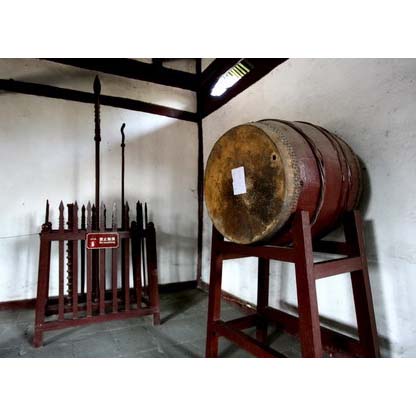dagu overview
 Big drum (Sanskrit name dundubhi) musical instrument name. A kind of percussion instrument, also known as Taiko and Tanggu, is also the most frequently used percussion instrument. That is, a hollow wooden cylinder is covered with leather for percussion instruments. The exterior color of the drum body is mostly red, and a few are black and wood color. The bass drum is struck by a single drumstick, called the big drumstick, with a head that can be used on both sides and is covered with wool or felt. Usually when struck, it is between the center of the drum and the rim of the drum, and the center of the drum is only used for short and fast hits (staccato) and special effects.
Big drum (Sanskrit name dundubhi) musical instrument name. A kind of percussion instrument, also known as Taiko and Tanggu, is also the most frequently used percussion instrument. That is, a hollow wooden cylinder is covered with leather for percussion instruments. The exterior color of the drum body is mostly red, and a few are black and wood color. The bass drum is struck by a single drumstick, called the big drumstick, with a head that can be used on both sides and is covered with wool or felt. Usually when struck, it is between the center of the drum and the rim of the drum, and the center of the drum is only used for short and fast hits (staccato) and special effects.It is generally used in Chinese music, opera, martial arts, festivals, temple fairs, sacrifices, battles, dragon and lion dance accompaniment. In Beijing rhyme drums "Drumming and Cursing Cao", "Liang Hongyu Beating the Drums and Fighting the Golden Mountain" and other repertoires, create a tense atmosphere; the common performance combination is the hall drum and cymbal.
In ancient Buddhism, it was used for beating and gathering people. In Volume 8 of "Youbu Mudjia", he said: "The six major capitals, Zhuxuan, etc., came to gather together, and since there were too many people, the time was lost. The Buddha said: You should fight the juveniles. Don't hear the trouble. The Buddha said: The drum should be hit."
In addition, drums are also used for warning purposes. In Volume 12 of The Great Tang Western Regions, the drums will also be used in ceremonies, dance music and military formations. Since the Tang Dynasty, large drums have been widely used in Zen forests. There are many kinds of "Dharma Drum", "Tea Drum", "Zhai Drum", "Geng Drum", "Bath Drum" and so on. Among them, the Dharma drum is beaten when the abbot is in the hall, when he is in the hall, when he is in the hall, when he speaks, and when he enters the room. Three strikes when going to the court, one strike when the small attendant, five strikes when the general speaking, three strikes when entering the room, all of which are slow strikes. When Zu Ji offered tea soup, the tea drum was struck with a long stroke, and the waiter presided over it. The fast drum hangs in front of the Kusi, and hits the three links during fasting. The Genggu is in charge of the headmaster, who will strike the tee in the morning and evening, and the rest will follow the Geng. The bath drum is to strike the four links during the bath, which is controlled by the bath.
- Pinyin:dà gǔ
- Fan Ming:dundubhi
- Classification:percussion
- alias:drum, drum
overview of other similar instruments
- sanyanxiao overview
- Daguangxian overview
- Leiqin overview
- hahao overview
- yandundagu overview
- Han Xiaozheng overview
- Fang Xiang overview
- guanzi overview
- zhuqin (Dao Qin) overview
- zhuiqin overview
- bangzi overview
- three-stringed piano overview
- Gehu overview
- xiao overview
- xiaokonghou overview
- Konghou overview
- Sheng overview
- suona overview
- hulusi overview
- gushao overview
 渝公网安备 50010702504639号
渝公网安备 50010702504639号